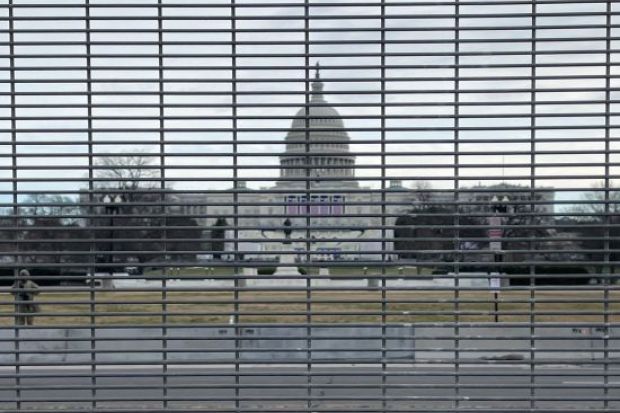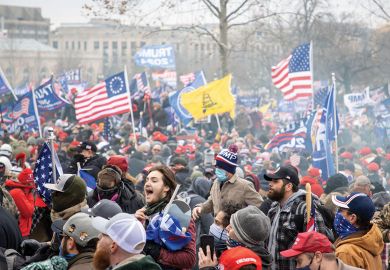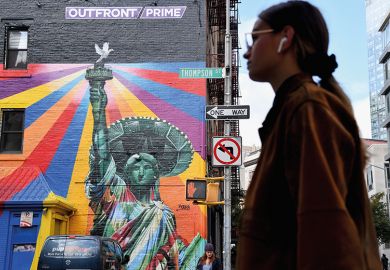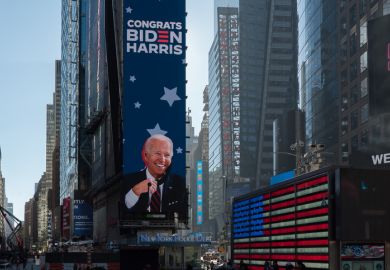Joe Biden extended a suspension of student loan payments in one of his first official acts as US president, heading an administration that promises an equity-minded expansion of higher education and its mission.
Mr Biden listed improvements in education and social understanding among his priorities for uniting and healing the nation in his inauguration speech. Later at the White House, alongside the loan repayment action, Mr Biden issued orders protecting young foreign-born immigrants from deportation, dissolving a Trump initiative to soften the teaching of the US history of slavery, and ending Trump-era bans on immigration from Muslim-majority nations and on the teaching within federal agencies of ways to counter racial and gender biases.
In a further show of intent to be more welcoming to foreigners, Mr Biden sent to Congress legislative language to overhaul US immigration rules that includes the prospect of citizenship for 11 million immigrants illegally in the country.
Mr Biden and his vice-president, Kamala Harris – both of whom have spouses teaching in higher education – took their offices with broad support among academic leaders who offered statements anticipating that his moves on immigration and funding will be the first among many that bolster their operations.
“There is much work ahead, with multiple crises and major challenges,” said Peter McPherson, the president of the Association of Public and Land-grant Universities. “But today’s executive orders are a very good first step for the new administration.”
Barbara Snyder, president of the Association of American Universities, said the arrival of the Biden administration “provides a unique – and crucial – opportunity to rebuild and reaffirm” ties between the government and higher education. Yet, said Ms Snyder, a former president of Case Western Reserve University, “there is still much work to be done to overcome what was the most divisive presidential election – and presidency – of our lifetimes”.
Both are among several heads of the major US higher education associations whom Mr Biden's nominee for education secretary, Miguel Cardona, met with online in the days just before the inauguration to hear their priorities.
While Mr Biden made a major campaign commitment to making public college tuition-free for all students for their first two years, and for all four years for low-income students, its actual prospects remain unclear, even with Democrats narrowly taking control of Congress.
Passing major immigration legislation also has been a significant challenge for Congress over the years, and experts in higher education and beyond expect that to be no different now, especially given the emotional importance of the issue to Trump partisans.
“It’s tough, I won’t deny it,” Janet Napolitano, a former president of the University of California system and US secretary of homeland security in the Obama administration, told CBS. But, she added, “something needs to be done, and it needs to be in a big way”.
Among other early indicators of Mr Biden’s priorities, he named Rohit Chopra, a leading advocate of legal protections for student loan borrowers, to head the Consumer Financial Protection Bureau.
But during their Senate confirmation hearings this week, Mr Biden's choices for top US diplomatic and national security posts affirmed the new president’s plan for a tough stance toward China, the leading supplier of foreign students to US colleges and universities.
“China is a challenge to our security, to our prosperity, to our values across a range of issues,” one of them, Avril Haines, the nominee for director of national intelligence, told the Senate’s Intelligence Committee. She promised a China policy “that is more assertive than where we had been in the Obama/Biden administration”.
For his part, Mr Trump ended a presidency widely reviled in academia for its assaults on basic truth by granting a pardon from criminal prosecution to a Florida developer who paid bribes to get his daughter admitted to the University of Southern California.
And in a likely boost to for-profit colleges, given their allies in the Trump administration’s Education Department, Mr Trump rescinded an order he instituted with much political fanfare four years ago that forbade administration officials from lobbying related to their agency.
Several other US colleges and universities, meanwhile, have begun distancing themselves from Mr Trump and allies who promoted his attempts to overturn Mr Biden’s election, evicting them from faculty and advisory positions and rescinding honorary degrees.
The pandemic and the threat of pro-Trump terrorism kept the traditional inaugural parade confined to almost only police and members of the US military. The chief exceptions were marching bands from the University of Delaware and Howard University, the alma maters of Mr Biden and Ms Harris.
Mr Biden is the first president since Ronald Reagan who did not attend an Ivy League institution. He is, however, surrounding himself with the products of elite academia, with Harvard University alone claiming connections to more than 60 Biden administration nominees and appointees, including five Cabinet members.
Ms Harris, meanwhile, is the first vice-president to graduate from a historically black institution.
Register to continue
Why register?
- Registration is free and only takes a moment
- Once registered, you can read 3 articles a month
- Sign up for our newsletter
Subscribe
Or subscribe for unlimited access to:
- Unlimited access to news, views, insights & reviews
- Digital editions
- Digital access to THE’s university and college rankings analysis
Already registered or a current subscriber?







